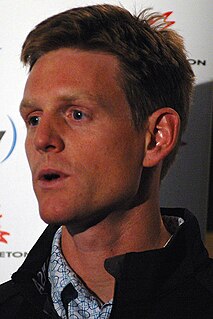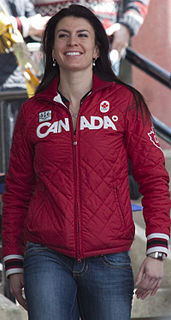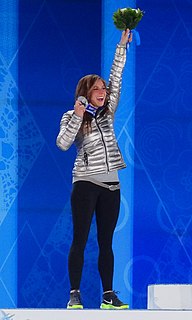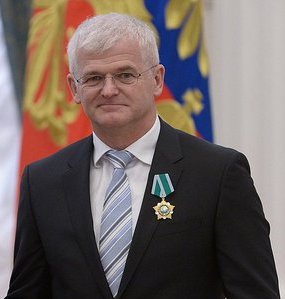
James Edmound Shea Jr. is an American skeleton racer who won the gold medal at the 2002 Winter Olympics in Salt Lake City. Shea also was chosen by fellow athletes to recite the Athlete's Oath during the Opening Ceremonies. Along with his father, Jim Shea Sr., he passed the Olympic Torch to Cammi Granato and Picabo Street who then passed it to the 1980 U.S. Men's Hockey Team, who then ignited the Olympic Cauldron. Shortly before the Olympics he was a guest of Laura Bush in the First Lady's Box at the 2002 State of the Union Address.

Skeleton is a winter sliding sport in which a person rides a small sled, known as a skeleton bobsled, down a frozen track while lying face down and head-first. The sport and the sled may have been named from the bony appearance of the sled.

Pierre Fritz Lueders is a Canadian Olympic, world and World Cup champion bobsledder who competed from 1990 to 2010. He piloted both two-man and four-man bobsleigh, retiring after the 2010 Winter Olympics. He was named to Canada's Sports Hall of Fame in 2012.

Duff Gibson is a Canadian skeleton racer who competed from 1999 to 2006. He was born in Vaughan, Ontario. His father was born on December 13, 1937. At the 2006 Winter Olympics in Turin, He won the gold medal in the men's skeleton, narrowly beating out his teammate Jeff Pain. With his victory, the 39-year-old Gibson surpassed ice hockey player Al MacInnis as the oldest gold medalist in Canadian Winter Olympic history. More significantly, Gibson became the oldest individual gold medallist in the history of the Winter Games, a record previously held by Norway's Magnar Solberg, who was 35 when he won the gold medal in the 20 km individual biathlon event at the 1972 Winter Olympics in Sapporo; he held the record until Ole Einar Bjørndalen won gold at the 10 km biathlon sprint aged 40 at the 2014 Sochi Olympics. He retired immediately following the 2006 Games in Turin.

Jeffrey Thomas "Jeff" Pain is an American-born Canadian former skeleton racer who competed from 1995 to 2010. He is regarded as one of the most successful male competitors in the history of the Canadian skeleton program. He was born in Anchorage, Alaska.
Kristan Bromley is a retired British skeleton racer who has competed since 1996. He won the gold medal in the men's event at the 2008 FIBT World Championships in Altenberg, Germany. This was Great Britain's first gold medal at the FIBT World Championships since 1965.

Martins Dukurs is a Latvian skeleton racer who has competed since 1998. He is a six-time world champion in men's skeleton, a double Olympic silver winner, and the athlete with the most World Cup titles, having won eight consecutive titles between 2010 and 2017, plus one additional title in 2020.
Martin Rettl is an Austrian skeleton racer who competed from 1989 to 2006. Competing in two Winter Olympics, he won a silver medal in the men's skeleton event at Salt Lake City in 2002.

Tomass Dukurs is a Latvian skeleton racer who has competed since 1998. Competing in three Winter Olympics, he finished fourth in the men's skeleton event at Vancouver in 2010 and Sochi in 2014.

Mellisa Hollingsworth is a retired Canadian athlete who competed from 1995 to 2014. She won the bronze medal in the women's skeleton event at the 2006 Winter Olympics in Turin.
Gerda Weissensteiner OMRI is an Italian luger and bobsleigh pilot who competed from the late 1980s to 2006. Competing in six Winter Olympics, she won the gold medal in the women's singles luge event at the 1994 Winter Olympics in Lillehammer, and together with Jennifer Isacco she won the bronze in Turin in the two-woman bobsleigh at the 2006 Winter Olympics. She was the first Italian sportsperson to win Olympic medals in two disciplines.

Noelle Pikus-Pace is an American retired skeleton racer who began her career in 2001. She won five medals at the FIBT World Championships, competed in the 2010 Winter Olympics in Vancouver, and won the silver medal in the 2014 Winter Olympics in Sochi.
Christian Auer is an Austrian skeleton racer who competed from the late 1980s to the 2002 Winter Olympics. He won five medals in the men's event at the FIBT World Championships with one gold (1991), two silvers, and two bronzes.

Wilfried "Willi" Schneider is a German skeleton racer who competed from 1992 to 2002. He won two medals in the men's skeleton event at the FIBT World Championships with a gold in 1998 and a bronze in 1999.
Michelle Kelly is a Canadian former skeleton racer who competed from 1994 to 2013. A two-time Olympian, Kelly is largely considered to be one of the pioneers of the sport of Women's Skeleton. Originally an elite gymnast, she was recruited for her explosive power to the Canadian Women's National Bobsleigh Team as a brakeman, competing from 1994 to 1999. In 1995 Kelly started sliding Skeleton and competing in both sports. When Women's Skeleton and Bobsled were both named to make their debut at the 2002 Winter Olympics in Salt Lake City, Kelly chose Skeleton. She finished 10th at those 2002 Games, and went on to earn the Olympic alternate position at the 2006 Torino Olympics, and another Olympic birth at the 2010 Winter Olympics, finishing 13th. Kelly won a complete set of medals at the FIBT World Championships with a gold in 2003, a silver in 2008, and a bronze in 2005, as well as taking the women's Skeleton World Cup overall title in 2002-3.

Kaillie Humphries is a Canadian-American bobsledder. Prior to becoming a naturalized US Citizen, Humphries represented Canada and is a two-time Olympic champion in the two-woman, and is the 2018 Olympic bronze medalist with brakeman Phylicia George. With her victory in 2014, she became the first female bobsledder to defend her Olympic title. Owing to her repeat championship, she was named flagbearer for the closing ceremonies at the 2014 Olympic Games together with brakewoman Heather Moyse. Humphries is also the two-time defending overall World Cup champion. To date, she is the most successful Canadian bobsledder in history. In 2019, she switched to representing the United States because of abuse and harassment that she claims she faced from the Canadian bobsled federation. She won three IBSF World Championships for Team USA in 2020,2021 seasons making her a 5x World Champion and the most decorated woman in bobsleigh history.
Christopher Hedquist is an American skeleton racer. In 2004 he won the overall European Cup, becoming the first American ever to win the title. He won gold at the 2005 World University Games in Innsbruck, Austria, the inaugural event for skeleton at the Games. He was an alternate in the 2006 Winter Olympics in Torino, Italy and retired following the 2007 World Cup season.
Michael Douglas is a Canadian skeleton racer who has competed since 2006. He played football and competed in track whilst at University in Toronto, and at the age of 30 he was discovered by racer Pascal Richard. He competed in the 2010 Winter Olympics but was disqualified before his third run for failing to remove the covers off the runner guards of his sled.

The men's skeleton event at the 2010 Winter Olympics in Vancouver, Canada, took place at the Whistler Sliding Centre on 18–19 February. Canada's Duff Gibson was the defending Olympic champion. Gibson retired after the 2006 Olympics. Switzerland's Gregor Stähli, the defending Olympic bronze medalist was the defending world champion, but did not compete due to a thigh injury sustained during the World Cup event in Lake Placid, New York, on 20 November 2009. The test event held at the venue was won by Jon Montgomery of Canada. The last World Cup event prior to the 2010 Games took place in Igls, Austria, on 23 January 2010 and was won by Latvia's Martins Dukurs who also won the overall World Cup title.

The women's skeleton event at the 2010 Winter Olympics took place at the Whistler Sliding Centre on 18–19 February. The competition was won by British athlete Amy Williams, who set new course records for the track on her first and third runs. Williams, who had never before won a World Cup or World Championship event, became the first British athlete to win a solo Winter Olympic gold medal in 30 years. German sliders Kerstin Szymkowiak and Anja Huber won the silver and bronze medals respectively. Williams' teammate Shelley Rudman, who had won the silver medal at the 2006 Winter Olympics, and Canadian Mellisa Hollingsworth, both of whom had been expected to be in medal contention, were disappointed.












